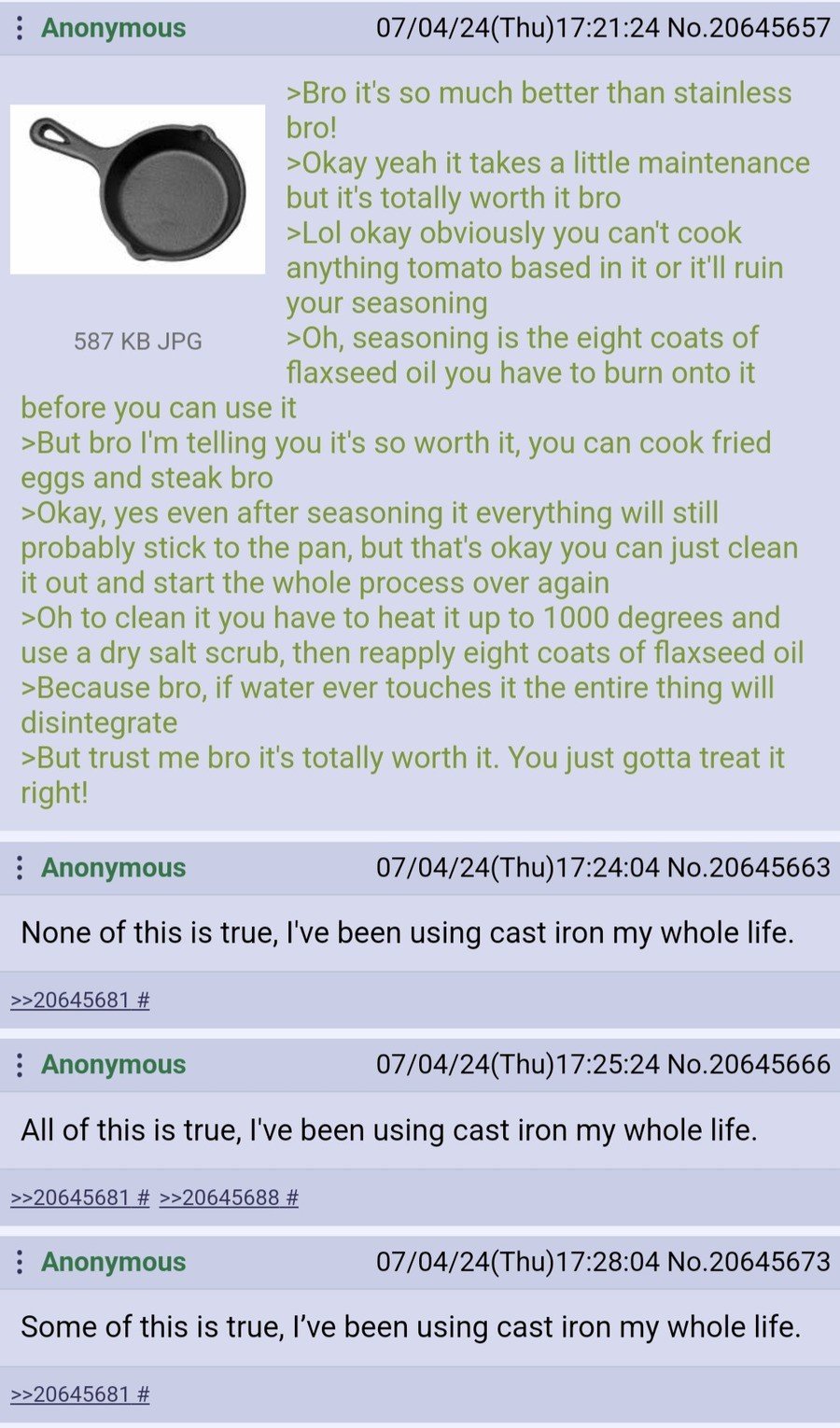this post was submitted on 02 Oct 2024
1088 points (99.4% liked)
Greentext
6588 readers
1130 users here now
This is a place to share greentexts and witness the confounding life of Anon. If you're new to the Greentext community, think of it as a sort of zoo with Anon as the main attraction.
Be warned:
- Anon is often crazy.
- Anon is often depressed.
- Anon frequently shares thoughts that are immature, offensive, or incomprehensible.
If you find yourself getting angry (or god forbid, agreeing) with something Anon has said, you might be doing it wrong.
founded 2 years ago
MODERATORS
you are viewing a single comment's thread
view the rest of the comments
view the rest of the comments

debatable but i think so
everything needs maintenance in the sense that you have to clean it. jokes aside, the only maintenance it needs is to burn oil in it if the seasoning got a little damaged for any reason
you can, it's not great but won't ruin it
that's not true, all cast iron pans come pre-seasoned from the factory
that is true
not really, it's pretty non-stick
not really, you only need to do that if the seasoning got damaged
that's not true, you'd have to leave it in water for days to get it to rust
things that aren't mentioned: you gotta use it regularly otherwise it gets sticky; you can use metal tools like knives and spatulas directly in the pan that would demolish any teflon; the seasoning is more resilient than people think, you can even wash it with dish soap; the seasoning actually gets stronger when you fry fatty things in it (grilled cheese, steaks, eggs, sausages); it's very simple, durable, rustic, old technology, and incredibly cheaper than skillets of a similar quality (excluding cheap teflon pans); you can unrust it in your garage and even weld it back together if it breaks, which is sick as hell.
I'm with you 100%.
I'll add that I rarely use my cast iron in the kitchen, preferring to use it on camping trips or the grill. Why? The sheer heft of the thing could accidentally cause my glass cooktop some trouble. For those occasions, I reach for my well-seasoned carbon steel pans: much lighter with most of the same non-stick situation as the iron skillet.
I don't know your glass cooktop, but i'd be shocked if the weight of a cast iron was enough to damage it. Does this mean you also wouldn't put a cooking pot full of water on it? Mine had no problem, didn't even get scratched which i was worried it might.
That said i do think cast irons can be too heavy for some people, especially when it's full
Here's the thing: I'm a klutz, and do not always watch my hands (damn ADHD). So this whole thread is semi-rational at best. Still, I'm certain that I'm the guy that would drop it one or more inches onto the cooktop by accident. I honestly don't know how resilient these things are, but I'm not about to find out.
That said, I looked up some numbers for weights and well, it's really not too different from a full pasta pot. I may just have to work up the courage. Thanks.
Yeah i believe you can break a cast iron, it will snap instead of bend, but i have no idea how hard you'd have to drop it. It also probably would damage the glass
Deep scratches are one major concern/gripe I have with glass cooktops, hence why my skillet goes nowhere near it. Scratches can introduce weak points that can nucleate a fracture.
https://glassdoctor.com/blog/why-did-my-glass-top-stove-crack
"some of this is true"
You can very easily de-rust cast iron cookware with Ospho which is basically phosphoric acid (Loctite naval jelly available at Lowe's is the same stuff in gelled form, which is a bit grosser). Obviously you have to rinse it really well afterwards, but it's a hell of a lot easier than trying to physically remove the rust.